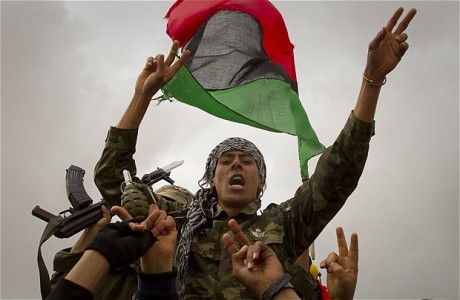
The rebels are "very sensitive to wanting to appear different from the Kadhafi forces and the abuses that those forces make in the field," Stevens told a news conference in Washington, where he was back for consultations.
"They got the message and I'm sure they're looking carefully at it and making sure it doesn't happen."
The United States joined Britain and France in a bombing campaign that began in March over fears of a bloodbath if Kadhafi's forces reached Benghazi.
The mission has been unpopular with many US lawmakers, who say that it is ill-defined and potentially open-ended as they question support for the rebels until more is known about them.
But Stevens, who initially sailed to Benghazi in a Greek cargo ship and now leads a US mission of just eight people, said his "strong impression" was that the NTC "are making progress" -- diplomatically, economically and on the battlefield.
"There's no alternative, except for Kadhafi. He is extremely unpopular throughout the country," Stevens said.
"It's not surprising to me that there are differences of opinion. The problem, of course, arises when they express their differences of opinion in a violent way," he said.
The rebels -- recognized by the United States as Libya's legitimate representatives -- said earlier they had discovered a sleeper cell of Kadhafi loyalists in their midst.
Fears of a fifth column reached fever pitch last week when rebel military chief General Abdel Fatah Yunis was gunned down in mysterious circumstances.
Stevens acknowledged major security problems in eastern Libya since Kadhafi lost control when the revolt erupted in February.
Militias took charge as many police left their posts due to fear of retribution for past abuses, Stevens said.
Stevens said the United States, Britain and France were urging the NTC to "get their arms around the militia problem so that they can provide better security as they try to move forward to Tripoli and hopefully to Kadhafi's departure."
Stevens said the United States was deferring to the rebels in deciding the fate of Kadhafi and called the issue "highly controversial" within the NTC.
Some rebels believe Kadhafi must leave Libya as otherwise "he'll just cause more problems and we'll have to deal with him forever," Stevens said. But he said other rebels believed letting Kadhafi step down and stay in Libya could end the conflict sooner.
"They've flip-flopped a little bit on that. And that's because there are different views and the leadership" of the NTC was "trying to be responsive to the street," he said.
France and Britain -- which pressed for the ongoing military campaign -- have also said that the decision on Kadhafi was up to the rebels.
But the prosecutor of the International Criminal Court has said that Libya is obliged to arrest Kadhafi, who is charged with crimes against humanity over his forces' bloody clampdown on protests in February.
-------------------------------------------------------------------------------------------
"They got the message and I'm sure they're looking carefully at it and making sure it doesn't happen."
The United States joined Britain and France in a bombing campaign that began in March over fears of a bloodbath if Kadhafi's forces reached Benghazi.
The mission has been unpopular with many US lawmakers, who say that it is ill-defined and potentially open-ended as they question support for the rebels until more is known about them.
But Stevens, who initially sailed to Benghazi in a Greek cargo ship and now leads a US mission of just eight people, said his "strong impression" was that the NTC "are making progress" -- diplomatically, economically and on the battlefield.
"There's no alternative, except for Kadhafi. He is extremely unpopular throughout the country," Stevens said.
"It's not surprising to me that there are differences of opinion. The problem, of course, arises when they express their differences of opinion in a violent way," he said.
The rebels -- recognized by the United States as Libya's legitimate representatives -- said earlier they had discovered a sleeper cell of Kadhafi loyalists in their midst.
Fears of a fifth column reached fever pitch last week when rebel military chief General Abdel Fatah Yunis was gunned down in mysterious circumstances.
Stevens acknowledged major security problems in eastern Libya since Kadhafi lost control when the revolt erupted in February.
Militias took charge as many police left their posts due to fear of retribution for past abuses, Stevens said.
Stevens said the United States, Britain and France were urging the NTC to "get their arms around the militia problem so that they can provide better security as they try to move forward to Tripoli and hopefully to Kadhafi's departure."
Stevens said the United States was deferring to the rebels in deciding the fate of Kadhafi and called the issue "highly controversial" within the NTC.
Some rebels believe Kadhafi must leave Libya as otherwise "he'll just cause more problems and we'll have to deal with him forever," Stevens said. But he said other rebels believed letting Kadhafi step down and stay in Libya could end the conflict sooner.
"They've flip-flopped a little bit on that. And that's because there are different views and the leadership" of the NTC was "trying to be responsive to the street," he said.
France and Britain -- which pressed for the ongoing military campaign -- have also said that the decision on Kadhafi was up to the rebels.
But the prosecutor of the International Criminal Court has said that Libya is obliged to arrest Kadhafi, who is charged with crimes against humanity over his forces' bloody clampdown on protests in February.
-------------------------------------------------------------------------------------------









 Home
Home Politics
Politics









